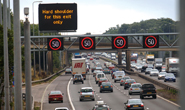EU unveils green car action plan
 Commission proposes wide-ranging new rules designed to promote adoption of clean vehicles and tackle manufacturers’ misleading green claims
Commission proposes wide-ranging new rules designed to promote adoption of clean vehicles and tackle manufacturers’ misleading green claimsThe European Commission has today unveiled a wide-ranging strategy designed
to establish the European car industry as a leading player in the global green
vehicle market, and ensure that electric vehicles can be recharged right across
the continent.
EU leaders in Brussels said the "concrete and ambitious"
action
plan would deliver many new initiatives designed to promote adoption of
clean and fuel-efficient vehicles and accelerate the development of new
low-carbon vehicle technologies.
"In 2010, the automotive industry enters into a defining phase for its future
success," said European Commission vice president Antonio Tajani, who leads
industry and entrepreneurship. "Including all types of vehicles in the strategy
will ensure that this parallel approach will strike the right balance between
securing the future competitiveness of our car manufacturing industry without
compromising our long-term goals for the reduction of greenhouse gases and other
pollutants."
The strategy includes an eight-point action plan which pledges to maintain
the existing regulatory framework to reduce vehicle emissions, support research
and innovation in green tech and to increase European market share in the global
vehicle market.
The strategy also details plans to encourage the use of electric vehicles
across Europe, including proposals to develop common standards for electric cars
so they can be charged anywhere in the EU.
In addition, the action plan proposes detailed new rules governing how car
manufacturers market the "green additionality" of their vehicles, promises a new
strategy to target emissions from heavy-duty vehicles, simplify the rules
governing clean vehicle research grants, and undertake a study to establish the
full life cycle emissions of different vehicle types, such as electric cars,
hybrids and conventional vehicles.
The action plan follows in the wake of a report published yesterday by the
European Environment Agency (EEA), which called on EU leaders to develop a
clearer vision and firm policies for Europe’s transport system.
The annual report, entitled
Towards
a resource-efficient transport system (TERM), claims that the European
transport system is struggling to curb carbon emissions, despite advances in new
technology, because of a rise in the distances people and goods are traveling.
"Today, we can see that the extensive investment in transport infrastructure
[during the past 10 years] has enabled us to travel further to meet our daily
needs, but has not led to a decrease in the amount of time that we are exposed
to noise, congestion and air pollution," explained EEA executive director
Jacqueline McGlade. "In the future we will need to focus not only on the mode of
transport, but also the reasons why people choose to travel, because ultimately
mobility is inextricably linked to our quality of life."
You can return to the main Market News page, or press the Back button on your browser.

